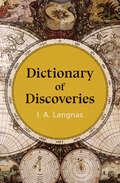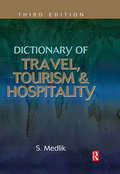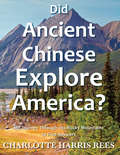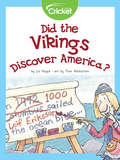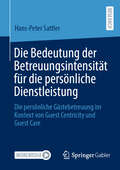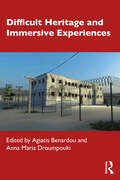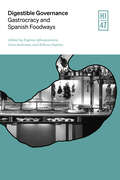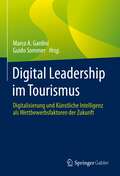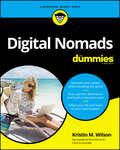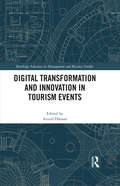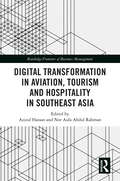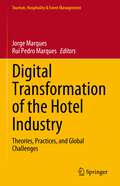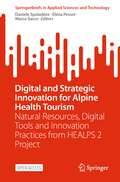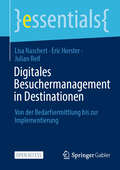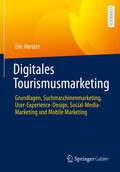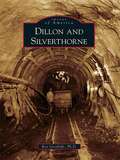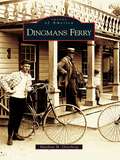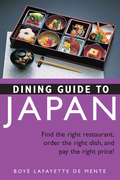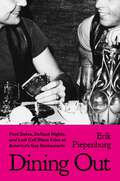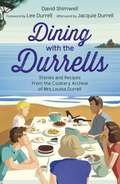- Table View
- List View
Dictionary of Discoveries
by I. A. LangnasA comprehensive reference volume of significant explorers, pioneers, and conquerors, from the ancient world to the twentieth century. Since the days when Alexander the Great vastly expanded the Hellenistic world, history has been shaped by the urge to discover—and conquer—unknown lands. In Dictionary of Discoveries, I. A. Langnas presents a thoroughly researched record of the major explorers, travelers, conquistadors, colonial officers, and others who contributed to the grand enterprise of discovery. Organized alphabetically, the entries give special focus to the Age of Discovery, a time when European societies embarked on far-reaching campaigns in search of new lands, trading routes, and knowledge. Famous names like Christopher Columbus, Daniel Boone, and Sir Ernest Shackleton are featured alongside lesser-known figures such as Grigori Shelekhov, theeighteenth-century Russian explorer of Alaska and the Kodiak Islands.
Dictionary of Travel, Tourism and Hospitality
by S. MedlikThis new edition combines within two covers:* A dictionary of 2500 terms* Descriptions of 300 organizations* A biographical dictionary of 100 personalities* Explanations of 1200 acronyms and abbreviations* Key data for well over 200 countries* A concise bibliography listing more than 100 useful sources of further informationThe author's long and wide experience of these fields makes this an indispensable companion for students and teachers, and those employed in relevant businesses and organizations, as well as for the travellers, tourists and guests who are the raison d'être of it all.
Did Ancient Chinese Explore America
by Charlotte Harris ReesA Chinese classic, the Shan Hai Jing, reportedly from 2000 BC claimed travels to the ends of the earth. However, today many, while accepting the antiquity of this account, believe it was just mythology. But was it?Testing the hypothesis that the Shan Hai Jing described actual surveys of North America, Charlotte Harris Rees, author of books about early Chinese exploration, followed an alleged 1100 mile Chinese trek along the eastern slope of the US Rocky Mountains. The Chinese account should have been easy to disprove. In the travelogue Did Ancient Chinese Explore America? Rees candidly shares her initial doubts then her search and discoveries. She weaves together history, subtle humor, academic studies, and many photographs to tell a compelling story.
Did the Vikings Discover America?
by Liz HuyckThe Viking named Erik the Red once left Norway for Greenland. He invited other Vikings to help establish a settlement in this new world.
Die Bedeutung der Betreuungsintensität für die persönliche Dienstleistung: Die persönliche Gästebetreuung im Kontext von Guest Centricity und Guest Care
by Hans-Peter SattlerIn der vorliegenden, geringfügig überarbeiteten Dissertation, wird die Bedeutung der individuellen Betreuungsintensität aus der Perspektive der hotelspezifischen Dienstleistung der Betreuung von Hotelgästen untersucht. Hierzu wird analysiert, wie Kultur, historische Branchenentwicklungen und ausbildungsrelevante Kompetenzen und Verhaltensweisen die Entwicklung der hotelspezifischen Dienstleistungen beeinflusst haben. Basierend auf der Forschungsfrage „Welche Bedeutung hat die Betreuungsintensität für die Erbringung von persönlichen Dienstleistungen?“ ist es das Ziel, am Beispiel der hotelspezifischen persönlichen Gästebetreuung im Hotel zu verstehen, welchen Stellenwert diese für die Gästebindung und die Beziehungsqualität zwischen Hotelgästen, Hotelmitarbeitern und Hotelbetrieb haben sollte. Als Ergebnisse stehen einerseits die Neubewertung der persönlichen Gästebetreuung als hotelspezifische Dienstleistung, die Etablierung des Gästequadranten als ganzheitliches Gästebetreuungsmodell sowie andererseits die Möglichkeit für Hotelmitarbeiter, Hotelbesitzer und/oder -betreiber, die individuelle Betreuungsintensität von Hotelgästen mithilfe vorgeschlagener Fähigkeiten, Berechnungsmethoden und Beurteilungsinstrumenten aus der Perspektive von Guest Centricity und Guest Care diagnostizieren zu können.
Difficult Heritage and Immersive Experiences
by Agiatis Benardou and Anna Maria DroumpoukiDifficult Heritage and Immersive Experiences examines the benefits involved in designing and employing immersive technologies to reconstruct difficult pasts at heritage sites around the world. Presenting interdisciplinary case studies of heritage sites and museums from across a range of different contexts, the volume analyzes the ways in which various types of immersive technologies can help visitors to contextualize and negotiate difficult or sensitive heritage and traumatic pasts. Demonstrating that some of the most creative applications of immersive experiences appear in and at museums and heritage sites, the book showcases how immersive technologies offer the possibility of confronting and disputing presumptions and prejudices, triggering responses, delivering new knowledge, initiating dialogue and challenging preexistingnotions of collective identity. The book provides a conceptual, as well as a hands-on, approach to understanding the use of immersive technologies at sensitive sites around the globe. Difficult Heritage and Immersive Experiences is essential reading for researchers and students who are interested in, or engaged in the study of, cultural heritage, memory, history, politics, dark tourism, design and digital media or immersive technologies. The book will also be of interest to museum and heritage practitioners.
Digestible Governance: Gastrocracy and Spanish Foodways (Hispanic Issues)
by Lara Anderson Eugenia Afinoguénova Rebecca IngramThe term &“gastrocracy&” refers to the appropriation of discourses and practices related to the sourcing, preparation, distribution, and consumption of food for political purposes. The intersections of gastronomy and governance, dating in Spain to the last quarter of the nineteenth century, have become highly visible over the past decade, when political debates around nationalism in its different forms have taken the guise of discussions about regional and local cuisines. Concomitant with the rise of the &“slow food&” movement and following UNESCO&’s addition in 2011 of &“Gastronomic Meal of the French&” to its list of Intangible Cultural Heritage of Humanity, public and private associations all around Spain have been established with the goal of achieving recognition by UNESCO for Spanish, Catalan, and other national cuisines. In 2016, Gastro Marca España—an association and a web portal—was launched to raise the profile of food in Spain&’s national brand. Eliciting wide public participation, co-opted for political purposes, regarded as a factor of economic development on any scale, and integrated into every so-called banal nationalism, the production, distribution, and consumption of food are highly relevant for historical analysis. Seeking to encourage a broader discussion about Peninsular gastrocracies, this book brings together an interdisciplinary group of scholars from different sides of the Atlantic and the Pacific who have spearheaded research on gastronomy and governance in Spain.
Digital Leadership im Tourismus: Digitalisierung und Künstliche Intelligenz als Wettbewerbsfaktoren der Zukunft
by Marco A. Gardini Guido SommerDieses Buch bietet einen Überblick über den State of the Art zum Thema Digitalisierung und Künstliche Intelligenz im Tourismus und in den damit verbundenen wesentlichen Gestaltungs- und Handlungsfeldern. Die Autoren diskutieren Entwicklungen in folgenden Kontexten: digitale Transformation, digitale Geschäftsmodelle, digitaler Wettbewerb, digitales Mindset und digitale Führungskompetenzen. Außerdem werden Fragen zur Rolle der Digitalisierung und Künstlichen Intelligenz im Spannungsfeld zwischen Effektivität, Effizienz und Ethik im Kontext einer Digital-Leadership-Perspektive betrachtet. Die instrumentelle und inhaltliche Bandbreite digitaler Technologien und digitaler Arbeitsformen in verschiedenen touristischen Teilbranchen und deren Akteure werden beleuchtet und es wird gezeigt, wie in diesem Themenkomplex Veränderung erfolgreich gestaltet werden kann. Denn Digitalisierung und Künstliche Intelligenz als Treiber des zukünftigen Unternehmenserfolgs sind einerseits Top-Themen in zahlreichen touristischen Branchen, andererseits zeigen viele aktuelle Unternehmenskonzepte, dass das Thema bislang für den Tourismussektor kaum analysiert und systematisiert wurde und in der Praxis vielfach unzureichend konzeptionell und organisatorisch verankert ist.Der Autoren-Mix aus Wissenschaft und Unternehmenspraxis macht den Sammelband zu einem Nachschlagewerk für jeden, den das Thema Digitalisierung und Künstliche Intelligenz im Tourismus bewegt.
Digital Nomads For Dummies
by Kristin M. WilsonWhy work from home when you can work anywhere? Not all who wander are lost! Digital Nomads For Dummiesanswers all your questions about living and working away from home, short term or long term. Become a globetrotter or just trot around your home country, with the help of experienced digital nomad Kristin Wilson. Millions of people have already embraced the lifestyle, moving around as the spirit takes them, exploring new places while holding down a job and building a fantastic career. Learn the tricks of building a nomad mindset, keeping your income flowing, creating a relocation plan, and enjoying the wonders of the world around you. Learn what digital nomadism is and whether it's the right lifestyle for you Uncover tips and ideas for keeping travel fun while holding down a 9-to-5 Travel solo or with a family, internationally or within your home country Create a plan so you can keep growing in your career, no matter where you are If you&’re ready to put the office life behind you and the open road in front of you, check out Digital Nomads For Dummiesand get your adventure started!
Digital Transformation and Innovation in Tourism Events (Routledge Advances in Management and Business Studies)
by Azizul HassanThe pandemic has accelerated the digital transformation in tourism and there has been a surge in new, innovative digital initiatives to help tourism businesses. This book provides a comprehensive treatment of the nature of tourism, events and practices in the digital context. The book looks at how technology has transformed tourism in destination branding, marketing, content marketing, sustainable tourism development and tourism events. It examines the impact of digital transformation on emotions, experiences, information technology tools and marketing techniques. The book will be a useful reference to those researching on tourism, culture, hospitality and marketing and as well as destination planners, managers of tourism destination marketing organizations, regulators, standards and certification bodies, local tourism board authorities and policy makers.
Digital Transformation in Aviation, Tourism and Hospitality in Southeast Asia (Routledge Frontiers of Business Management)
by Azizul Hassan and Nor Aida Abdul RahmanTechnological advances and the drive to digitalize business processes in aviation, tourism, and hospitality have forced the industries to go along with the digital movement. The results are often mixed. This book brings together contributions from leading scholars in the field and explores the digital transformation in these industries in Southeast Asia. The book looks at the impact of digital transformation on the region and the issues and challenges brought about by this transformation. It also addresses trends in the industries from blockchain technology, AI, biometric and mobile technology applications to in-flight catering. It examines the impact of COVID-19 on the industries and how the pandemic has led to businesses adopting new business models. Through the case studies of digital adoptions in the region, readers will gain insights on how the countries have leveraged new technologies and the implementation processes to drive digital transformation. The book aims to help scholars and policy makers understand the digital advances in the industries to better formulate responses in research and policy making and deliver effective digital transformation.
Digital Transformation of the Hotel Industry: Theories, Practices, and Global Challenges (Tourism, Hospitality & Event Management)
by Rui Pedro Marques Jorge MarquesThe hotel industry has gone through important transformations, not only in terms of management and operation but also in terms of interaction with consumers. Technological development and adaptation to the digital era have been one of the greatest challenges for hotels. This book aims to fill the gap in the literature in this specific area of the tourism sector and contribute to a better understanding of trends and challenges in the hotel industry on a global scale.
Digital and Strategic Innovation for Alpine Health Tourism: Natural Resources, Digital Tools and Innovation Practices from HEALPS 2 Project (SpringerBriefs in Applied Sciences and Technology)
by Marco Sacco Daniele Spoladore Elena PessotThis open access book presents a set of practical tools and collaborative solutions in multi-disciplinary settings to foster the Alpine Space health tourism industry’s innovation and competitiveness. The proposed solutions emerge as the result of the synergy among health, environment, tourism, digital, policy and strategy professionals. The approach underlines the pivotal role of a sustainable and ecomedical use of Alpine natural resources for health tourism destinations, and highlights the need of integrating aspects of natural resources’ healing effects, a shared knowledge of Alpine assets through digital solutions, and frames strategic approaches for the long-term development of the sector. The volume exploits the results of the three-years long EU research project HEALPS 2, which involved several stakeholders from the health tourism, healthcare and sustainable tourism industries. This book is relevant for health tourism destinations and facilities (hotels, clinics, wellness and spa companies), regional and local authorities (policy makers), business support organizations, researchers involved in digital healthcare and geoinformatics.
Digitales Besuchermanagement in Destinationen: Von der Bedarfsermittlung bis zur Implementierung (essentials)
by Eric Horster Lisa Naschert Julian ReifDieses Open-Access-Essential erläutert die Entwicklung eines digitalen Besuchermanagementsystems für Destinationen von der Bedarfsermittlung bis zur Implementierung und Ausspielung. Zunächst müssen der Bedarf an Entlastungsmaßnahmen ermittelt und Ziele für das Besuchermanagement festgelegt werden. Daten aus diversen Quellen werden verarbeitet, gespeichert und an Gäste und Tourismusmanagementorganisationen weitergegeben. Im Anschluss wird ein Recommender entwickelt: ein Empfehlungssystem für Gäste, das auf KI basiert. Es werden Auslastungs- und Frequenzdaten modelliert und prognostiziert. Gewonnene Informationen über Auslastung und mögliche Alternativen werden der Öffentlichkeit auf verschiedenen (digitalen) Kanälen zur Verfügung gestellt. Zusammenfassungen der wichtigsten Erkenntnisse sowie eine Schritt-für-Schritt-Vorgehensbeschreibung runden das Essential ab.
Digitales Tourismusmarketing: Grundlagen, Suchmaschinenmarketing, User-Experience-Design, Social-Media-Marketing und Mobile Marketing
by Eric HorsterDas Buch zeigt, wie digitale Strukturen und Prozesse erkannt und neue Technologien im Marketing bewertet und genutzt werden können. Neben Grundlagen zum digitalen Tourismusmarketing stehen Suchmaschinenmarketing, User-Experience-Design, Social-Media-Marketing sowie Mobile Marketing und die Verbindung von digitalen und realen Erlebniswelten im Fokus.Im ersten Teil des Buches werden die Besonderheiten des Internets herausgearbeitet und in die Customer Journey eingebunden, um den Prozess und die Struktur eines digitalen Tourismusmarketings ableiten zu können. Dadurch werden die Lesenden befähigt, die Bedingungen einzuschätzen, unter denen sich digitale touristische Marketingmaßnahmen abspielen. Im zweiten Teil werden Wege aufgezeigt, wie Websites für Suchmaschinen optimiert werden können und wie über Suchmaschinen Werbung geschaltet werden kann. Teil 3 zeigt, wie digitale Anwendungen im Hinblick auf deren User-Experience verglichen, analysiert und bewertet werden können. Ein besonderer Fokus wird auf Website-Optimierung und Relaunch-Prozesse gelegt. Im vierten Teil wird unter Zuhilfenahme zahlreicher Best-Practice-Beispiele der Einsatz verschiedener sozialer Netzwerke in Bezug auf unterschiedliche Marketingziele diskutiert und die verschiedenen Dienste und Netzwerke werden vorgestellt. Im fünften Teil werden technologische Trends beleuchtet, die sich auf das Mobile Marketing sowie den Einsatz von digitalen Endgeräten am Urlaubsort selbst beziehen. Dies wird insbesondere durch Beispiele von eher geschlossenen touristischen Räumen wie Festivals, Freizeitparks, Kreuzfahrtschiffen und Skigebieten erläutert. Das Buch schließt mit einem Ausblick auf mögliche zukünftige Entwicklungen im digitalen Tourismusmarketing.
Digitalisierung im stationären Reisevertrieb: Der Einfluss von In-Store-Technologien auf das Kaufverhalten
by Christine KühnDer stationäre Reisevertrieb sieht sich durch die gesteigerte Nutzung von Online-Kanälen zur Suche und Buchung von Reisen einem erhöhten Wettbewerb in der Tourismusbranche ausgesetzt. In-Store-Technologien – wie die Virtual Reality-Brille, der Touchscreen und das Tablet – werden zur Unterstützung in der Beratung im stationären Reisevertrieb genutzt. Deren Bedeutung wird aufgrund der Verzahnung von Online- und Offline-Kanälen im Zuge der Digitalisierung zunehmend höher. Die Untersuchung des Einflusses von In-Store-Technologien auf das Kaufverhalten ist Gegenstand der Publikation. In einer dreistufigen Untersuchung wird aufgezeigt, welche Determinanten der In-Store-Technologien im Hinblick auf das Kaufverhalten relevant sind und welchen Einfluss diese auf die Kaufabsicht aus Sicht des Konsumenten haben. Darüber hinaus werden zukunftsgerichtete Handlungsempfehlungen für die Unternehmenspraxis abgeleitet, welche als Entscheidungsgrundlage nützlich sein können.
Dillon and Silverthorne
by Roy GoodliffeLake Dillon sits at almost 2 miles high in the Rocky Mountains. The dam and reservoir that produced this Summit County resort, along with Dillon Village on its shore and the town of Silverthorne just below it, are collectively one of Colorado's winter-summer fun destinations. Dillon Dam is 5,288 feet long by 231 feet high, creating a large freshwater source for the city of Denver, as well as 25 miles of scenic shoreline. The dam stores 85.5 billion gallons of water from the Snake and Blue Rivers and Ten Mile Creek. On cue, these waters rush eastward to the South Platte River Basin through the Transmontane Project, or Roberts Tunnel--augered hundreds of feet under the Continental Divide in one of the West's most controversial water relocation epics. Today Dillon, Silverthorne, and the Blue River Basin on Colorado's western slope see their share of sailboating, snow and Nordic skiing, windsurfing, and snowboarding.
Diners of New York
by Mario Monti Michael EngleMaps pinpoint locations. Comprehensive listings for each region. Includes diner styles and manufacturers.
Diners of Pennsylvania
by Kevin Patrick Brian Butko Kyle R. Weaver Jacqueline BreuilRevised and updated edition of the best-selling first edition (978-0-8117-2878-2).
Diners, Drive-ins and Dives: An All-American Road Trip ... with Recipes!
by Guy Fieri Ann VolkweinFood Network star Guy Fieri takes you on a tour of America's most colorful diners, drive-ins, and dives in this tie-in to his enormously popular television show, complete with recipes, photos, and memorabilia. Packed with Guy's iconic personality, Diners, Drive-ins and Dives follows his hot-rod trips around the country, mapping out the best places most of us have never heard of. From digging in at legendary burger joint the Squeeze Inn in Sacramento, California, baking Peanut Pie from Virginia Diner in Wakefield, Virginia, or kicking back with Pete's "Rubbed and Almost Fried" Turkey Sandwich from Panini Pete's in Fairhope, Alabama, Guy showcases the amazing personalities, fascinating stories, and outrageously good food offered by these American treasures.
Dingmans Ferry
by Matthew M. OsterbergFor over 200 years, the small village of Dingmans Ferry grew along the banks of the Delaware River. This once small town thrived first as a farming community and later as a summer retreat for New York and Philadelphia residents. Dingmans Ferry provides a tour of this fascinating community that was lost in the late 1970s after the area was purchased for the proposed Tocks Island Dam Project. The incredible mills, country churches, one-room schools, and family homes come alive in this grand photo essay. Drawn from the collections of the Dingmans Ferry/Delaware Township Historical Society, Pike County Historical Society, and private collections, these photographs include familiar sights such as Darragh Mill, St. John's Episcopal Church, and the Academy. Famous residents such as Chief Thundercloud and Marie Zimmerman are also highlighted in this photographic journey through an area long forgotten.
Dining Guide to Japan
by Boye Lafayette De MenteDining in Japan is both an art and an adventure-- an experience that is made memorable by the variety of unique dishes, their gourmet quality, and the style in which they are served! With Dining Guide to Japan, you will have an extensive list of Japanese restaurants and exquisite food dishes.Dining Guide to Japan acts as a perfect Japan travel guide which includes:Dining and Transportation MapsJapanese Dining Vocabulary and Pronunciation Additional Food Vocabulary Detailed Descriptions of Japanese CuisineJapan is literally a diner's paradise, with restaurants featuring the world's leading cuisine, from Chinese, French, German, Greek, Indian, Italian, Korean and Russian to Vietnamese. Japan's traditional food is world famous for its health and longevity enhancing properties and is not all rice and raw fish. In fact, Japanese cuisine is both varied in ingredients and cooking styles, and most foreign visitors quickly develop a taste for such things as miso soup, nori, oyako-don, ramen, shabu-shabu, soba, sukiyaki, tofu, tonkatsu, udon, unagi, yaki-tori... and yes, even fugu, the deadly globefish!
Dining Out: First Dates, Defiant Nights, and Last Call Disco Fries at America's Gay Restaurants
by Erik PiepenburgFrom a New York Times journalist, a culinary tour of gay restaurants—their history, and how they evolved as a space of safety and celebration for the LGBTQ+ community—full of joy, sex, sorrow, activism, and nostalgia.Dining Out explores how gay people came of age, came out, and fought for their rights not just in gay bars or the streets, but in restaurants. From cruisy urban cafeterias of the 1920s to mom-and-pop diners that fed the Stonewall generation to the intersectional hotspots of the early 21st century. Using archival material, original reporting and interviews, and first-person accounts, Erik Piepenburg explores how LGBTQ restaurants shaped and continue to shape generations of gay Americans. Through the eyes of a reporter and the stomach of a hungry gay man, Dining Out examines the rise, impact and legacies of the nation's gay restaurants past, present, and future, connecting meals with memories. Hamburger Mary&’s, Florent, a suburban Denny&’s queered by kids: Piepenburg explores how these and many other gay restaurants, coffee shops, diners, and unconventional eateries have charted queer placemaking and changed the modern LGBTQ civil rights movement for the better.
Dining with the Durrells: Stories and Recipes from the Cookery Archive of Mrs Louisa Durrell
by Lee Durrell David Shimwell'We lolled in the sea until it was time to return for tea, another of Mother's gastronomic triumphs. Tottering mounds of hot scones; crisp paper-thin biscuits; cakes like snowdrifts, oozing jam; cakes dark, rich and moist, crammed with fruit; brandy snaps brittle as coral and overflowing with honey. Conversation was almost at a standstill; all that could be heard was the gentle tinkle of cups, and the heartfelt sigh of some guest, accepting another slice of cake.' - My Family and Other Animals, Gerald DurrellIn Dining with the Durrells, David Shimwell has delved into the Durrell family archives to uncover Louisa Durrell's original recipes for the scones, cakes, jams, tarts, sandwiches and more that are so deliciously described by the Durrell family. From her recipe for 'Gerry's Favourite Chicken Curry' to 'Dixie-Durrell Scones with Fig and Ginger Jam', and including the family stories and photos that accompany them, this book will transport you to long lunches enjoyed on the terrace of a strawberry-pink villa, sunshine-filled picnics among the Corfu olive groves and candlelit dinners overlooking the Ionian Sea.
Dining with the Durrells: Stories and Recipes from the Cookery Archive of Mrs Louisa Durrell
by Lee Durrell David Shimwell'We lolled in the sea until it was time to return for tea, another of Mother's gastronomic triumphs. Tottering mounds of hot scones; crisp paper-thin biscuits; cakes like snowdrifts, oozing jam; cakes dark, rich and moist, crammed with fruit; brandy snaps brittle as coral and overflowing with honey. Conversation was almost at a standstill; all that could be heard was the gentle tinkle of cups, and the heartfelt sigh of some guest, accepting another slice of cake.' - My Family and Other Animals, Gerald DurrellIn Dining with the Durrells, David Shimwell has delved into the Durrell family archives to uncover Louisa Durrell's original recipes for the scones, cakes, jams, tarts, sandwiches and more that are so deliciously described by the Durrell family. From her recipe for 'Gerry's Favourite Chicken Curry' to 'Dixie-Durrell Scones with Fig and Ginger Jam', and including the family stories and photos that accompany them, this book will transport you to long lunches enjoyed on the terrace of a strawberry-pink villa, sunshine-filled picnics among the Corfu olive groves and candlelit dinners overlooking the Ionian Sea.
